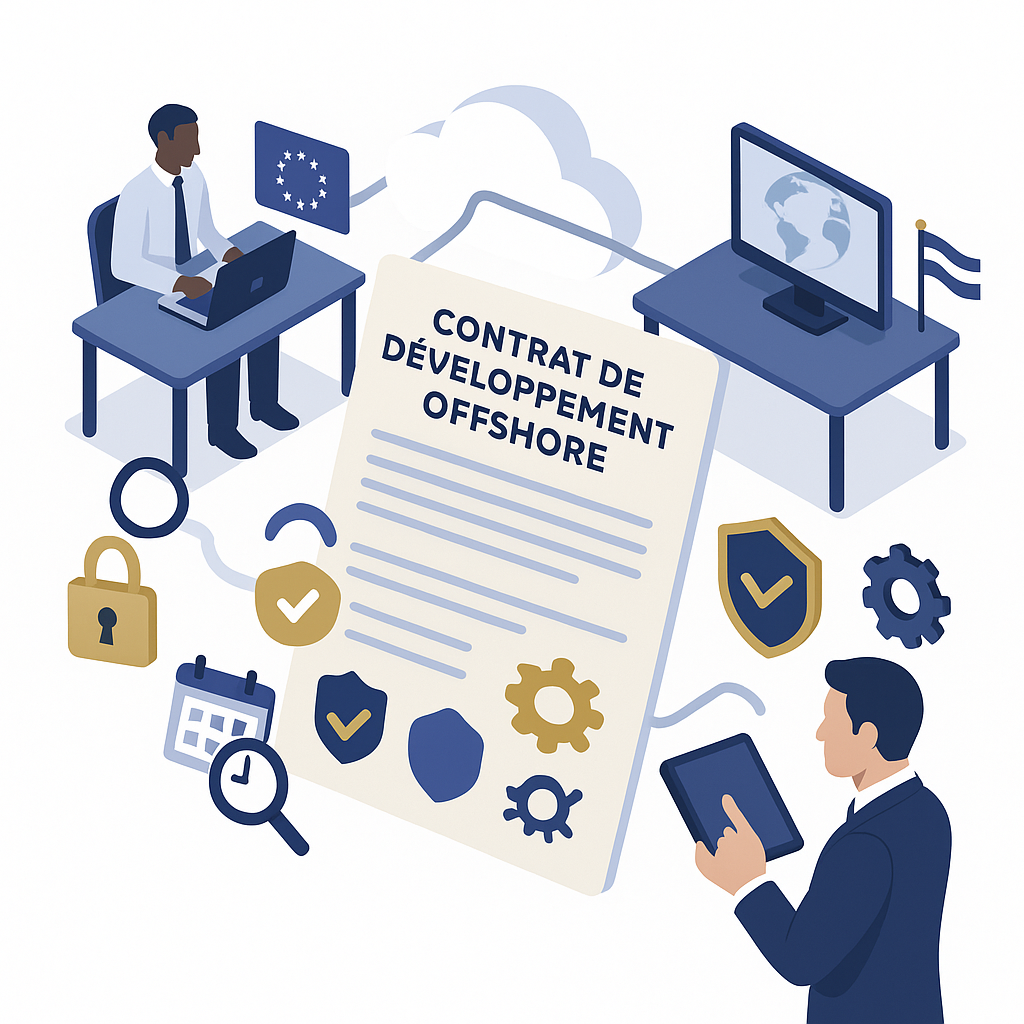The globalization of the IT sector has considerably altered the software development landscape, with increasing use being made of service providers located abroad. This approach, commonly referred to as offshore development, offers undeniable economic and technical advantages, but also gives rise to specific legal challenges that require particular attention when drafting software development contracts.
In addition to the standard clauses found in all IT contracts, international projects require provisions adapted to cross-border issues. This article guides you through the essential clauses to ensure the legal security of your offshore software development projects.
If you need a software development contract lawyer, contact me!
Choice of law and jurisdiction: the foundation of your legal security
The first fundamental question to be addressed in an international contract concerns the determination of the legal framework that will apply to the contractual relationship.
Applicable law: a strategic choice
The principle of party autonomy allows the parties to freely choose the law governing their contract. This choice is of vital importance, as it will determine the interpretation of contractual clauses and the suppletive rules applicable in the event of silence in the contract.
A comparative legal analysis carried out by a specialist will enable you to assess the advantages and disadvantages of the various options. Choosing French law has the advantage of familiarity for the French customer, but may meet with reluctance on the part of the foreign service provider. Conversely, opting for the law of the service provider's country or a third-party law (such as Swiss law) may be an acceptable compromise, but requires a thorough understanding of the legal implications.
In the absence of an explicit choice, complex conflict-of-laws rules will determine the applicable law, creating legal uncertainty that is detrimental to both parties.
Jurisdiction: anticipating the settlement of disputes
Alongside the choice of applicable law, the designation of the competent jurisdiction in the event of a dispute is a decisive factor in the legal certainty of the contract.
The preventive litigation strategy developed by a well-designed software development contract makes it possible to consider several options:
- Attribution of jurisdiction to the courts of a specific country
- International arbitration, particularly suited to cross-border commercial relations
- Setting up preliminary mediation mechanisms or dispute boards
The choice between these options will depend on a number of factors, including the value of the contract, the expected technical complexity of any disputes, and the challenges of enforcing decisions in different countries.
Relationship with international public policy rules
Despite the principle of party autonomy, certain mandatory rules cannot be set aside by the contract. These mandatory rules apply regardless of the law chosen by the parties.
Our cross-border legal expertise enables us to identify the imperative rules likely to have an impact on your project (personal data protection, technological export controls, intellectual property regimes) and to adapt your contract accordingly, thus avoiding unpleasant surprises during its execution.
Personal data protection: RGPD obligations in an international context
The General Data Protection Regulation (GDPR) imposes specific obligations on transfers of personal data outside the European Union, with a direct impact on offshore development projects.
Supervision of personal data transfers
When software development involves the processing of personal data by a service provider located outside the EU, the contract must include appropriate safeguards to govern this transfer.
The RGPD contractual engineering developed by a consultant integrates the appropriate legal mechanisms:
- Standard contractual clauses adopted by the European Commission
- Binding corporate rules for multinational groups
- Approved codes of conduct or certification schemes
The Schrems II case law of the CJEU (July 16, 2020) has made such transfers considerably more complex, requiring an assessment of the specific risks associated with the recipient's country and additional protective measures where necessary.
Specific RGPD compliance clauses
In addition to the transfer mechanisms, the contract must specify the respective obligations of the parties in terms of personal data protection.
The secure contractual approach integrates several essential elements:
- The precise legal status of the parties (controller / processor)
- The specific obligations of the processor (art. 28 of the RGPD)
- Technical and organizational safety measures
- Data breach notification procedures
- Audit and control mechanisms
The potential liability in the event of a breach of the RGPD (up to 4% of worldwide sales) justifies particular attention to these clauses, which cannot be limited to generic formulations.
Compliance documentation
The accountability-based approach promoted by the RGPD requires being able to demonstrate the compliance of the processing carried out, including in an international context.
The proactive documentation methodology proposed by a lawyer allows you to build a robust documentation including :
- Data Protection Impact Assessment (DPIA) for high-risk processing operations
- Documentation of appropriate guarantees for transfers
- Procedures for managing the rights of data subjects
- Mapping cross-border data flows
This documentation is an essential part of your defense in the event of an inspection by a data protection authority.
Payment terms and tax issues: securing the financial aspect
The financial aspects of offshore contracts have their own peculiarities, requiring tailored clauses to minimize the risk of project disruption.
International payment terms
International payments entail specific risks that justify detailed contractual provisions.
The secure financial architecture developed in a well-designed contract provides for :
- Payment currency and currency risk management
- Practical details of international transfers
- Staggered payments based on clearly defined milestones
- Payment guarantee mechanisms (letter of credit, escrow account)
- Late payment procedures
These provisions must take account of the regulatory constraints associated with international financial transfers, which can vary considerably depending on the country concerned.
Tax implications of offshore contracts
The international dimension of the contract raises complex tax issues that need to be anticipated.
Preventive tax analysis identifies and addresses a number of tax issues:
- The possible application of withholding taxes in the customer's country
- VAT treatment of international supplies of services
- Risks of qualifying as a permanent establishment
- Application of double taxation agreements
These tax considerations can have a significant impact on the overall economics of the contract, and must be taken into account at the negotiation stage to avoid unforeseen cost overruns.
Managing currency fluctuations
For long-term contracts, exchange rate fluctuations can represent a significant risk for either party.
The adaptive contract strategy offers several mechanisms for managing this risk:
- Monetary indexation clauses with fluctuation corridors
- Periodic review of rates in line with changes in interest rates
- Contractual sharing of foreign exchange risk
- Hedging mechanisms built into the contract
The choice between these different options will depend on the duration of the contract, the amounts involved and the risk appetite of the parties involved.
Protecting intellectual property in an international context
Intellectual property is a major issue in software development contracts, with specific dimensions in an international context.
Disparities in intellectual property regimes
Software protection regimes differ from country to country, despite partial harmonization via international treaties.
Global legal expertise in intellectual property matters enables us to identify relevant local specificities and adapt contractual clauses accordingly. Particular attention must be paid to the protection of algorithms, user interfaces and databases, whose protection regimes vary significantly from one jurisdiction to another.
Transfer of rights adapted to the international context
Customized contract engineering offered by a specialist integrates several essential dimensions:
The assignment of intellectual property rights must be formulated taking into account the particularities of the local law applicable to the service provider.
- Precise identification of the creations concerned by the transfer
- The geographical and temporal scope of the assigned rights
- Rights specifically transferred (reproduction, modification, distribution, etc.)
- The treatment of moral rights is particularly important in civil law systems.
- Guarantees against claims by third parties (in particular employees or subcontractors of the service provider)
These clauses must be drafted in accordance with the formal requirements specific to each country to ensure their validity and enforceability.
Protecting know-how and confidential information
In addition to copyright-protected creations, the contract must secure the know-how and confidential information shared as part of the project.
The integrated protection strategy includes detailed provisions concerning :
- Precise definition of information considered confidential
- Confidentiality obligations of the parties and their collaborators
- The technical security measures required to protect this information
- The duration of post-contractual confidentiality obligations
- Control mechanisms and sanctions in the event of violation
These clauses are particularly important in jurisdictions where the protection of business secrecy is less developed than in Europe.
Managing time differences and cultural differences in the contract
The practical aspects of international collaboration also deserve contractual attention to prevent operational difficulties.
Organizing communication and project governance
The time difference and geographical distance require rigorous structuring of communication between teams.
The pragmatic contractual framework for this dimension includes :
- Defining official communication channels
- Frequency and procedures for progress meetings
- Expected response times according to the criticality of the subjects
- Collaborative tools and how to access them
- The official language of the project and any translation requirements
These elements, which are often relegated to the operational appendices, deserve special legal attention, as they condition the satisfactory performance of the contract and can have an impact on the assessment of responsibilities in the event of difficulties.
Knowledge transfer and transition clauses
The dependency created by offshore development requires contractual anticipation of knowledge transfer and transition procedures.
Strategic anticipation of transitions is reflected in specific clauses concerning :
- Documentation requirements (level of detail, language, formats)
- Training and skills transfer initiatives
- Recovery periods for shift changes
- Post-contractual assistance obligations
- Conditions of access to source code and technical environments
These provisions provide essential protection against the risk of over-dependence on the offshore service provider, and facilitate continuity of operations in the event of difficulties.
Managing public holidays and local constraints
Calendar differences (public holidays, vacation periods) can have a significant impact on project progress, and must be taken into account in the contract.
The pragmatic intercultural approach integrates these elements into contract planning:
- Identifying periods of low availability in different countries
- The division of responsibilities during these periods
- Emergency escalation procedures
- Impact on contractual deadlines and penalties
- Possible catch-up mechanisms
This dimension, often overlooked, can have important legal consequences if deadlines are missed or incidents occur during these special periods.
Exit strategies and continuity planning: anticipating the end of the relationship
All offshore contracts must anticipate their own termination, whether normal or premature, by providing mechanisms to ensure the customer's operational continuity.
Offshore-specific reversibility clauses
Reversibility refers to all operations enabling the customer to regain control of developments and continue to use the software without interruption.
Reversibility engineering, drawn up by a legal expert, precisely defines :
- The scope of reversibility (documentation, source codes, environments, data)
- The technical operations required and their sequence
- Respective responsibilities during the transition phase
- Duration and costs of reversibility services
- Validation criteria for effective reversibility
These provisions provide essential protection against the risk of over-dependence on the offshore service provider.
Early termination clauses adapted to the international context
The conditions for early termination of a contract must be particularly detailed in an international context, where enforcement can be complex.
The secure contract strategy includes exit mechanisms adapted to different scenarios:
- Termination for convenience with notice and compensation
- Termination for default with formal notice process
- Automatic termination in certain circumstances (insolvency, change of control)
- Partial termination allowing continuity of essential elements
- Accelerated procedures for serious breaches
The drafting of these clauses must take into account the specific features of the applicable law and the enforcement mechanisms available in the countries concerned.
Managing international force majeure situations
The notion of force majeure varies considerably from one legal system to another, and requires a precise contractual definition, particularly in an international context.
The comparative legal approach enables us to draw up a suitable clause that :
- Precise definition of events considered force majeure
- Establishes notification and mitigation obligations
- Provides for temporary suspension of obligations
- Defines the conditions for prolonged force majeure termination
- Organizes the financial and operational consequences
This clause takes on particular importance in the context of geopolitical, health or climatic risks likely to affect the countries of the contracting parties in different ways.
Legal expertise as a key success factor
Offshore software development, despite its undeniable advantages, presents specific legal challenges that require particular attention when drafting the contract. The clauses outlined in this article are a starting point for securing your international project, but will need to be adapted to your particular situation and the jurisdictions involved.
Investing in a well-established contract provides insurance against cross-border legal risks, and contributes directly to the operational success of the project by clarifying the expectations and responsibilities of each party.
Our law firm regularly assists French companies with their international software development projects, combining legal expertise with an understanding of technical and intercultural issues. This global approach enables us to draw up contracts that are both legally robust and operationally effective, tailored to the specific features of each offshore project.




